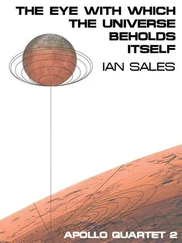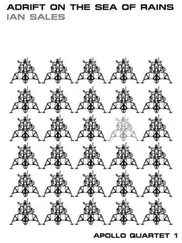This way, Walden says brusquely. And he’s off again down the corridor.
#

#
Another building, another gym-sized room. This, explains Walden, is the Apollo Lunar Mission Simulator. There are banks and banks of computers, with flashing lights and reels of tape that abruptly zip clockwise then anticlockwise. There is a great cubical frame of steel girders off to one side, and just visible within it is a grey and cratered diorama. And there are the three simulators, which look like someone opened a giant closet and all the boxes inside just fell out into piles. Walden points over at a large U-shaped console which looks up at one of the simulators.
That’s where the pencil-necks set up the mission parameters, he tells her. It’s all computerised.
There’s a lot of computers, Ginny says.
Yeah, 4.2 million bucks’ worth.
It’s a sum beyond imagining for Ginny, though not, she suspects, inconceivable to those closely involved with Apollo—after all, putting a man into space, putting a man on the Moon , is a hugely expensive endeavour.
This way, says Walden. This is the LM simulator.
He takes Ginny’s arm and leads her up a short flight of red-carpeted stairs to a platform at the back of the piles of boxes, and he steps through an entranceway into the simulator itself. Ginny halts at the jamb and peers in, and she can feel her pulse quicken as she takes in the grey panels of switches and dials and readouts, the two tiny triangular windows, the hand controllers—and it all looks so very real , an actual spacecraft, something that’s designed to operate in space, to land on the surface of another world. Cold fingers run up her spine and she thinks about magazine and book covers and descriptions in prose in short stories and novellas and novels, about spaceship bridges and control rooms, and here she is gazing at a tiny cabin which will carry two men to the Moon, and in no wa y does it resemble anything her imagination might have created from the science fiction she has read over the years. She looks down at her feet and wonders if she should take off her heels, they might damage the lunar module, she’s heard it is fragile, walls as thin as a beercan’s—but this, of course, is just a simulator, and the floor is good and solid. So she steps inside beside her husband and he tells her she’s at the commander’s position. She grabs a hand controller with each gloved hand and she stares through the window, which is really some kind of screen, at the surface of the Moon, which is really the diorama she saw earlier inside the giant steel framework. Now she’s starting to feel a little faint, she might even swoon, the sheer physicality of this tiny spacecraft cabin, of the grey instrument panels on every available surface, the dials, the switches, the digital readouts, the little blue and black ball bobbing this way and that beneath a glass etched with reticulations, and everything carefully labelled, so meticulously labelled. Her husband could be going to the Moon, she thinks. She knows this, she’s known it for two years now. (Of course, he might never get selected for a flight—there are sixty-one of them now, and not enough missions for all.) Until this moment, it has never quite struck her precisely what this means. Ginny has read science fiction for much of her life, she calls herself a fan, she has written letters to the magazines, she writes stories, many of the science fiction authors whose books she sees in book stores, she considers friends. But it all means nothing when confronted with this. Sense of wonder, imagination, pictures painted with the mind’s eye, it all pales into insignificance, seems to flatten to two dimensions like some painted backdrop, a theatrical flat, when compared to this reality, to Apollo, the lunar module, this machine which will put two astronauts—and one of them could be her husband!—on the surface of an alien planet.
Walden is speaking: See, we fly the LM down from lunar orbit to the surface, it’s mostly all done by the pings but we might have to take over for the last few feet.
Ginny has recovered from her near-fainting fit. She turns to her husband and says, Pings? Like they have in submarines?
But no, that can’t be right—there’s no air in space, so there’s no sound, Ginny knows that much.
Pings, says Walden, P-G-N-C-S, Primary Guidance, Navigation and Control System.
So how does that work? she asks. Explain it to me, like you would to another astronaut.
Another astronaut? asks Walden.
You know what I mean. She grins—and adds, I love it when you talk dirty.
It is intended to be a joke, a lightening of the mood, though this cramped cabin with its grey instrument panels doesn’t lend itself to frivolity.
Walden evidently feels that way: Dirty? It’s technical , Ginny.
Tell me about the switches and these things—what do you call these things?
Barber poles.
And this? What’s this? she asks and presses idly on the number-pad. Verb? she asks. Noun?
Diskey, he tells her.
She looks at him, not understanding.
He spells it out: D S K Y—Display Keyboard. We call it the diskey.
What’s it for?
Programming the guidance computer, he tells her.
And all these switches?
Jeez, Ginny, you want me to explain every one we’ll be here all day.
What’s these ones? Ascent He, Descent He. What’s He?
The moment she says it, she figures out that “He” is helium, but she says nothing as Walden replies:
The fuel for the rocket engines has to be kept pressurised, so we use helium because it’s inert.
Ginny may have studied Lit at SDSU, but she knows what helium is.
The fuel for the engines is hypergolic, Walden adds.
There’s a relish to the way he says “hypergolic”, like it’s a secret word, the password to some secret club. Ginny doesn’t know what it means, why should she? Yet she can think of plenty of words Walden could not define, and not just ones like “camisole” or “pleat”, but even scientific terms she has come across during her years of reading science fiction, such as “parsec” and “semantics”. She even knows what the Fermi Paradox is, and she’s pretty sure Walden has no idea.
Hypergolic, he explains, means the two fuels ignite as soon as they mix. We don’t need to burn them, like on the Saturn V.
They should use women as astronauts, we’re smaller, says Ginny, we’d use less fuel, we even use less oxygen, less water, less food.
It takes more than that, hon. It takes years of training, of flying jet fighters.
So flying a spacecraft is like flying a jet fighter?
Well, no, not really, I guess.
So why do astronauts need to be jet fighter pilots?
It’s complicated.
Walden, you can’t even cook a roast dinner, and you’re telling me being an astronaut is too complicated for a woman?
Women could never be astronauts, he insists. It’s just the way it is.
She doesn’t know it, but Ginny’s point has already been proven—as I have written elsewhere in another work of fiction. In August 1961, Dr W Randolph Lovelace II gave a talk at a symposium of aerospace scientists in Stockholm in which he declared women better suited as astronauts, based on the medical testing he had given to female pilot Geraldyne M Cobb. “We are already in a position to say that certain qualities of the female space pilot are preferable to those of her male colleague,” he told his audience. Cobb’s testing was in all the newspapers, and covered extensively by Life magazine—but Ginny’s journey of discovery, her exploration into making use of her husband’s profession in her science fiction writing, requires her to be ignorant of the Mercury 13. And so the Eckhardts were in Germany at that time, and Ginny’s chief link with home was her science fiction magazines. Which, for some reason, made no mention of it, a lack of sisterly solidarity that might be considered uncharacteristic, although perhaps the magazines’ readerships mostly felt, as Jackie Cochran did when she testified before a Congressional subcommittee against a women’s astronaut program, that it was men’s job to lead the way and for women to follow on and “pick up the slack”.
Читать дальше













